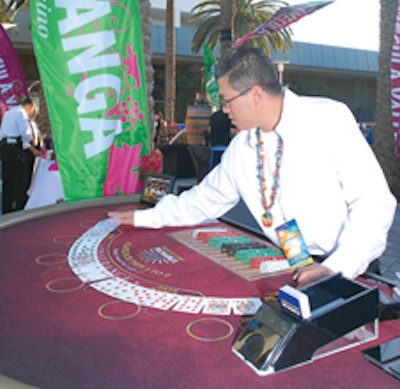
Pechanga Resort and Casino offered gaming at the Anaheim/Orange County Visitor & Convention Bureau's closing-night party for the International Pow Wow.
Photo: Adrienne Helitzer
In January, California passed a bill allowing qualifying nonprofits to host charity poker nights. While the bill’s exacting regulations outline everything from permissible games to the time allowed for each fund-raiser (no more than five hours in duration), the laws for gaming at corporate events are less clear-cut and may differ from county to county. Here’s how to play by the latest rules.Don’t forget to file paperwork. Eligible nonprofits—those that have been in existence for more than three years, are qualified to conduct business in California, and are exempt from taxation according to provisions in the Revenue and Taxation Code—must register annually with the Division of Gambling Control, pay a registration fee that can run as high as $100, and keep annual disclosure reports for individual events.
Stick to certain games. Gaming options at fund-raisers are limited to “controlled games,” defined as poker, Pai Gow, and similar-style games that use cards or tiles and have been approved by the Division of Gambling Control. At least 90 percent of the profits from the fund-raiser must go to the nonprofit, and game winners may only receive donated prizes valued at $500 or less.
For corporate events, book casinos or check with authorities. The obvious way to legally host a casino night as a for-profit entity is to tap into one of the state’s many tribal casinos. Otherwise, for-profits can allow guests to gamble in a purely for-fun environment where none of the three elements of gambling (consideration, chance, and prize) are present, but these elements may be interpreted in a number of ways—for instance, exchanging money to have a vendor provide the necessary gaming equipment may be interpreted as consideration. The state’s attorney general and the Division of Gambling Control defer to district attorneys in these cases, and advise organizations to get in touch with their local D.A. to determine what is legally allowed in their county.
Stick to certain games. Gaming options at fund-raisers are limited to “controlled games,” defined as poker, Pai Gow, and similar-style games that use cards or tiles and have been approved by the Division of Gambling Control. At least 90 percent of the profits from the fund-raiser must go to the nonprofit, and game winners may only receive donated prizes valued at $500 or less.
For corporate events, book casinos or check with authorities. The obvious way to legally host a casino night as a for-profit entity is to tap into one of the state’s many tribal casinos. Otherwise, for-profits can allow guests to gamble in a purely for-fun environment where none of the three elements of gambling (consideration, chance, and prize) are present, but these elements may be interpreted in a number of ways—for instance, exchanging money to have a vendor provide the necessary gaming equipment may be interpreted as consideration. The state’s attorney general and the Division of Gambling Control defer to district attorneys in these cases, and advise organizations to get in touch with their local D.A. to determine what is legally allowed in their county.



















